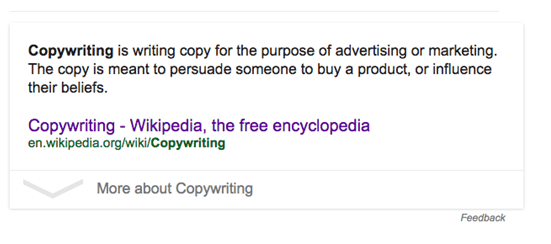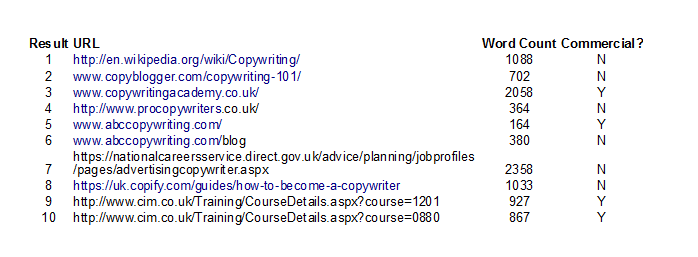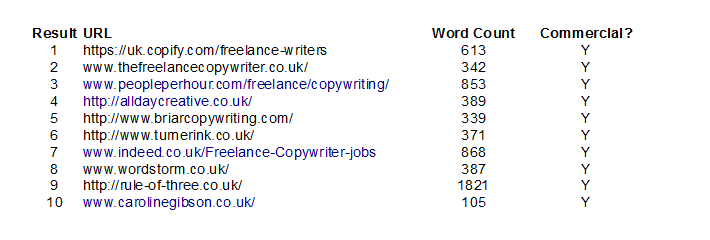Is Google favouring long-form content in its results?
Something rather strange happened recently to the results for one of our major keywords 'copywriting' - see SERPs. For the past 12 months or so, our homepage has consistently appeared in the top 10 results for the term – the largest volume search term in our industry.
This page has been replaced with various other landing pages, most recently settling on a guide we produced titled 'How to become a copywriter.' This is despite the fact that this page does not include the term 'copywriting' in the meta data or header tags on the page and has no external back links.
I suspected that the replacement of this page may have been due to an algorithmic penalty due to overzealous use of the term in link building to the homepage. However, AHREFS data suggests that this term represents just 4% of anchor text, which seems unlikely to have sparked a penalty.
So what is going on?
The first thing to note about this SERP is the presence of a Knowledge Graph Snippet, pulled in from the Wikipedia page on copywriting (which unsurprisingly also ranks at position #1).
This suggests that Google has identified this as a knowledge search, rather than a transactional search.

If we take a look at the SERP in more detail:

Of these 10 results:
- The average word count is 994.
- 7 results are over 700 words, only 3 are less.
- Of the 3 results under 700 words, neither appears in the top 3 positions.
- Only 4 of the 10 results have any direct commercial intent.
If we compare this to another SERP for the term 'freelance copywriters', the results are very different:

The key findings from this search are:
- All pages have a clear commercial intent and a call to action.
- The average word count is almost 400 words less than that of 'copywriting' at 608.
- There doesn't appear to be any correlation between word count and ranking – although the top result is above average, only this and one other page in the top 5 are over 600 words.
What conclusions can be drawn from this?
Google's quest for quality content in results has been well documented. A recent rollout of the Panda update has continued to reward sites with rich, unique content and punish those with 'thin' or duplicate content.
The correlation between page length and rankings has been explored before, with a 2012 study by SERPIQ revealing that on average, the longer a page, statistically the higher it will appear in the SERPs.
Google appears to be gaining a clear understanding of the underlying reason behind searches. A search for copywriting is to gather information rather than to directly seek the services of a freelance copywriter. Therefore, it seems to be favouring long form, informative content, rather than shorter, landing pages for this SERP.
If your SEO campaign is focused on generic, information terms such as this, you should look at developing your pages to offer longer, more informative Q&A style content to improve both user experience and your chances of ranking.
 Thanks to Martin Harrison for sharing their advice and opinions in this post. Martin is co-founder of copywriting service Copify. You can follow him on Twitter or connect on LinkedIn.
Thanks to Martin Harrison for sharing their advice and opinions in this post. Martin is co-founder of copywriting service Copify. You can follow him on Twitter or connect on LinkedIn.





 Thanks to Martin Harrison for sharing their advice and opinions in this post. Martin is co-founder of copywriting service
Thanks to Martin Harrison for sharing their advice and opinions in this post. Martin is co-founder of copywriting service 

